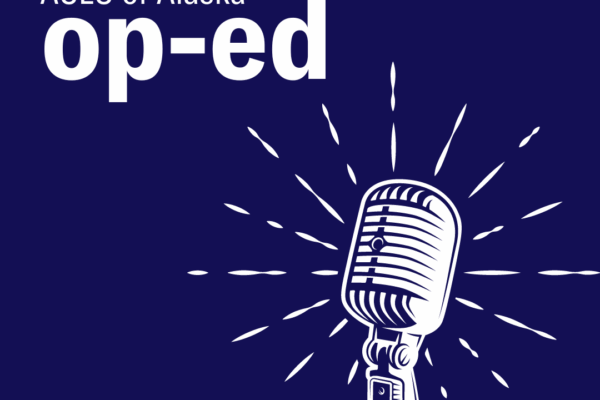The following was published as an opinion editorial by Mara Kimmel, executive director of the American Civil Liberties Union of Alaska; Deepika Ramesh Perumal, executive director of the Alaska Literacy Project; Lori Pickett, former executive director of the Alaska Literacy Project; and Lara Nations and Rebecca Maxey, co-chairs of the Immigration Law Section of the Alaska Bar Association. in the Anchorage Daily News on December 14, 2024. The original piece can be found here.
Alaska is home to people and cultures from around the globe and across the North. The tradition and spirit of welcoming is a value embedded in these lands since time immemorial. Alaskans understand that we rely on each other for our successes and our survival. When a snowstorm or cold weather threatens our safety, what matters is our willingness to extend a hand, not what color or political persuasion, sexual orientation or citizenship status may be on the other end of that hand.
Being a welcoming community ensures that we integrate people who choose to call Anchorage home. According to the Alaska Federation of Natives, Anchorage is 12.4% Native American and Alaska Native. Foreign-born Alaskans make up 10.8% of Anchorage residents and are deeply rooted members of our statewide community. Almost 40% of foreign-born Alaskans have been here for over 20 years. Alaska ranks fourth among all states for the percentage of people who have become U.S. citizens. Thousands of Alaskan families include at least one person who is foreign-born.
Anchorage is a richer city when we welcome new residents. My Shawarma House, which just celebrated one year, is owned and operated by a Somali immigrant family. A step inside and a conversation with the owner exemplifies what it means to be a neighbor. Anchorage is home to an increasing number of Afghans, arriving 2021, who served with the U.S. military oversees in special forces and as interpreters and translators. Anchorage residents provided home goods, food, furniture and more to welcome more than 100 arrivals in less than three months. We know how to be good neighbors.
The economic benefits of immigration in Alaska are powerful. Grow North Farm, a visual and lasting redefinition of a city block in Mountain View, is refugee and immigrant farmers operating the largest growing space in the municipality and generating over $100,000 in local commerce annually. Foreign-born Alaskans contribute labor and capital to our state at a time when it is sorely needed. Immigrants account for one in nine workers in the state. More than 40,000 immigrant workers constituted 11% of the labor force in 2018 in every economic sector of our state. Immigrants are also essential in addressing Alaska’s most pressing challenges: outmigration. As many longtime residents leave the state in search of opportunities elsewhere, immigrants and their families bring fresh energy, skills and perspectives that help stabilize and grow our communities. By embracing and supporting immigrants, we invest in the sustainability and future of our state.
Newcomers are vital to our culture, our community, our economy and our families. Our organizations work with new Alaskans every day to ensure people can be successful in their new life here. It’s up to us all to maintain Alaska as a welcoming, inclusive place where people can thrive. We start by honoring all of our residents, and all they do to make our communities better. We continue by defending their rights to the American promise they are afforded under the Alaska and U.S. Constitution, just like every other person in our state and country. We hold strong for our families and our neighbors because we know our greatest future is rooted in living up to the values that are embedded in the honored lands on which we now live and work.
Our greatest strength lies in our collective humanity. In celebrating, protecting and welcoming every resident, we honor the best of Alaska and ensure a brighter future for all.
Mara Kimmel is the executive director of the American Civil Liberties Union of Alaska. Deepika Ramesh Perumal is the executive director of the Alaska Literacy Project. Lori Pickett is the former executive director of the Alaska Literacy Project. Lara Nations and Rebecca Maxey are co-chairs of the Immigration Law Section of the Alaska Bar Association (writing in their individual capacities as immigration lawyers). All of these organizations serve immigrants and refugees in Alaska.

